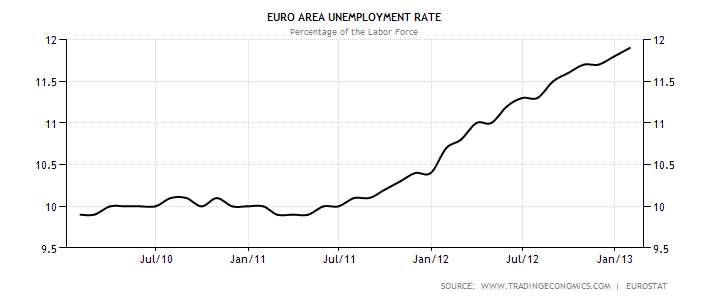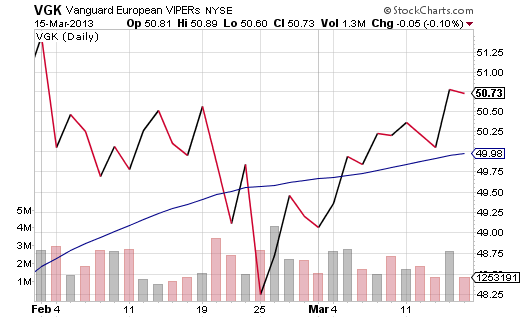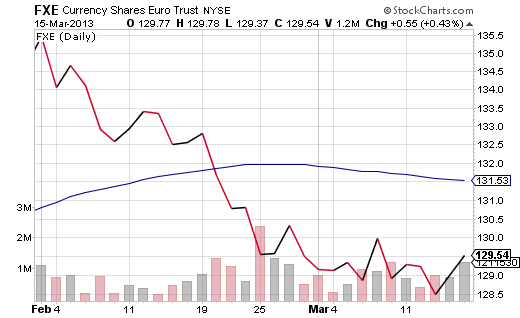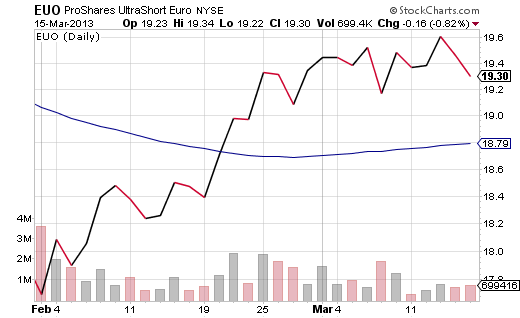Many member countries of the euro-zone have had to agree to cut spending and increase taxes. Since there is no government stimulus to go around, unpopular austerity measures have placed a noticeable burden on businesses and consumers to grow respective economies.
Unfortunately, consumers do not appear to be capable of ending the region’s recession. In the 17 countries using the euro, wages are growing at the slowest pace since the final quarter of 2010. Spain, Italy and Portugal are battling a deflationary spiral where lower prices are hampering wages and demand. Worse yet, the entire area’s unemployment rate is trending higher; the euro-zone’s rate currently sits at a record high of 11.9%.

Granted, European stocks have had a pretty decent run…and why shouldn’t they have experienced some success? The president of the European Central Bank (ECB) had vowed to do whatever would be necessary to protect the euro 7 1/2 months ago. European stocks do tend to move higher when the rest of the world’s markets are climbing. Additionally, countries like Germany and Austria have been relatively resilient, providing Europe with some reason for hope.
On the other hand, hope has not translated into a renaissance. In fact, hope is so far out on the horizon that harsh realities may soon take a chunk out of the region’s currency as well as unhedged European Stock ETFs.
Consider a handful of realities that currently exist. European institutions that are responsible for disbursements of loans to keep Greece afloat recently left Greece because the Athens government refused to release 25,000 government workers. The Italian government, nearly impotent after its anti-austerity election weeks ago, is asking for more “flexibility” to deal with its deficit. French president Hollande is not even asking for flexibility…he is dictating; he essentially expressed that the French government would not cut its deficit spending to 3% of GDP. And if that weren’t enough, the International Monetary Fund (IMF) believes that many European Union banks are not only beleaguered by losses associated with ownership of sovereign country debt, but they are also struggling with additional losses on bad loans made to households and businesses.
In truth, even as U.S. stocks have catapulted higher through the month of March, the Vanguard MSCI Europe ETF (VGK) has waffled since the start of February; the exchange-traded tracker remains below its 2013 February highs. Meanwhile, CurrencyShares Euro Trust ETF (FXE) has declined steadily since February first began.


What can one expect going forward? The debtor member countries will beg to borrow more, but their cries will be ignored by the wealthy and spendthrift Germany. Just as the citizens of Greece, Spain, Portugal, Italy and others take to the street to protest austerity, German citizens will protest endless bailouts for its overspending neighbors. In other words, in the springtime and a part of the summertime, one should expect euro-zone disharmony to cause the euro-dollar and European equities to take a hit.
By September, however, the investing environment might improve markedly. Not only will there be efforts by the ECB and IMF to shore up confidence in the region’s future (lower rates might be a possibility), but the German elections will have concluded. At that time, we could see a more stimulative and more accommodative German government.
For now, conservative investors should simply stay clear of the region’s stock ETFs until the German election draws closer. More aggressive investors could consider shorting the euro via ProShares UltraShort Euro ETF (EUO).

Disclosure: Gary Gordon, MS, CFP is the president of Pacific Park Financial, Inc., a Registered Investment Adviser with the SEC. Gary Gordon, Pacific Park Financial, Inc, and/or its clients may hold positions in the ETFs, mutual funds, and/or any investment asset mentioned above. The commentary does not constitute individualized investment advice. The opinions offered herein are not personalized recommendations to buy, sell or hold securities. At times, issuers of exchange-traded products compensate Pacific Park Financial, Inc. or its subsidiaries for advertising at the ETF Expert web site. ETF Expert content is created independently of any advertising relationships.
Unfortunately, consumers do not appear to be capable of ending the region’s recession. In the 17 countries using the euro, wages are growing at the slowest pace since the final quarter of 2010. Spain, Italy and Portugal are battling a deflationary spiral where lower prices are hampering wages and demand. Worse yet, the entire area’s unemployment rate is trending higher; the euro-zone’s rate currently sits at a record high of 11.9%.

Granted, European stocks have had a pretty decent run…and why shouldn’t they have experienced some success? The president of the European Central Bank (ECB) had vowed to do whatever would be necessary to protect the euro 7 1/2 months ago. European stocks do tend to move higher when the rest of the world’s markets are climbing. Additionally, countries like Germany and Austria have been relatively resilient, providing Europe with some reason for hope.
On the other hand, hope has not translated into a renaissance. In fact, hope is so far out on the horizon that harsh realities may soon take a chunk out of the region’s currency as well as unhedged European Stock ETFs.
Consider a handful of realities that currently exist. European institutions that are responsible for disbursements of loans to keep Greece afloat recently left Greece because the Athens government refused to release 25,000 government workers. The Italian government, nearly impotent after its anti-austerity election weeks ago, is asking for more “flexibility” to deal with its deficit. French president Hollande is not even asking for flexibility…he is dictating; he essentially expressed that the French government would not cut its deficit spending to 3% of GDP. And if that weren’t enough, the International Monetary Fund (IMF) believes that many European Union banks are not only beleaguered by losses associated with ownership of sovereign country debt, but they are also struggling with additional losses on bad loans made to households and businesses.
In truth, even as U.S. stocks have catapulted higher through the month of March, the Vanguard MSCI Europe ETF (VGK) has waffled since the start of February; the exchange-traded tracker remains below its 2013 February highs. Meanwhile, CurrencyShares Euro Trust ETF (FXE) has declined steadily since February first began.


What can one expect going forward? The debtor member countries will beg to borrow more, but their cries will be ignored by the wealthy and spendthrift Germany. Just as the citizens of Greece, Spain, Portugal, Italy and others take to the street to protest austerity, German citizens will protest endless bailouts for its overspending neighbors. In other words, in the springtime and a part of the summertime, one should expect euro-zone disharmony to cause the euro-dollar and European equities to take a hit.
By September, however, the investing environment might improve markedly. Not only will there be efforts by the ECB and IMF to shore up confidence in the region’s future (lower rates might be a possibility), but the German elections will have concluded. At that time, we could see a more stimulative and more accommodative German government.
For now, conservative investors should simply stay clear of the region’s stock ETFs until the German election draws closer. More aggressive investors could consider shorting the euro via ProShares UltraShort Euro ETF (EUO).

Disclosure: Gary Gordon, MS, CFP is the president of Pacific Park Financial, Inc., a Registered Investment Adviser with the SEC. Gary Gordon, Pacific Park Financial, Inc, and/or its clients may hold positions in the ETFs, mutual funds, and/or any investment asset mentioned above. The commentary does not constitute individualized investment advice. The opinions offered herein are not personalized recommendations to buy, sell or hold securities. At times, issuers of exchange-traded products compensate Pacific Park Financial, Inc. or its subsidiaries for advertising at the ETF Expert web site. ETF Expert content is created independently of any advertising relationships.
